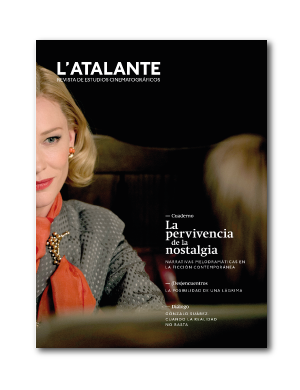La contribución de Werner Herzog a los estudios acerca de la animalidad
Publicades 2018-01-31
Paraules clau
- Werner Herzog,
- violencia,
- conflicto,
- animalidad,
- Gran Forma
- Naturaleza ...Més
Com citar
Resum
Apenas en los últimos tiempos los historiadores y críticos culturales, y en particular aquellos que estudiamos la animalidad, es decir, la relación entre el humano y el animal a través de la historia, nos hemos dado cuenta de algo que Werner Herzog advierte desde hace medio siglo: que «la naturaleza nos quiere muertos». Se refiere así a la esencia conflictiva y asimétrica de nuestra relación con la naturaleza, con el mundo no-humano, y en particular con la animalidad. El objetivo de este artículo es proponer una lectura herzoguiana de la animalidad, una que revalorice el papel del conflicto en la relación humano-animal, en detrimento de aquella centrada en el consenso y enfatizada por el grueso de los investigadores de la especialidad. Afortunadamente existen personajes que, como Herzog, piensan a contramano.
Descàrregues
Referències
Berger, J. (1980). <em>About Looking</em>. Londres: Writers and Readers Publishing Cooperative.<br>
Cavalieri, P. (2009). <em>La questione animale. Per una teoria allargata dei diritti umani</em>. Turín: Bollati Boringhieri.<br>
Comolli, J.-L., Sorrel, V. (2016). <em>Cine, modo de empleo. De lo fotoquímico a lo digital.</em> Buenos Aires: Manantial.<br>
Cragnolini, M. (2016). <em>Extraños animales. Filosofía y animalidad en el pensar contemporáneo</em>. Buenos Aires: Prometeo.<br>
Cronin, P. (ed.) (2014). <em>Herzog por Herzog</em>. Buenos Aires: El cuenco de plata.<br>
Cyrulnik, B., Matignon, K. L., Fougea, F. (2001). <em>La Fabuleuse aventure des hommes et des animaux</em>. París: Hachette Littérature, Éditions du Chêne.<br>
Deleuze, G. (1983). <em>La imagen-movimiento. Estudios sobre cine 1</em>. Buenos Aires: Paidós.<br>
Derrida, J., Roudinesco, É. (2001). <em>De quoi demain…</em> París: Champs / Flammarion.<br>
Ferrer, C. (2009). <em>La mala suerte de los animales</em>. Buenos Aires: Biblioteca Nacional.<br>
Gandy, M. (1996). Visions of Darkness: The Representation of Nature in the Films of Werner Herzog. <em>Ecumene, 3</em>(1), 1-21.<br>
Herzog, W. (2008). <em>Conquista de lo inútil</em>. Buenos Aires: Entropía.<br>
— (2013). <em>Manual de supervivencia. Entrevista con Hervé Aubron y Emmanuel Burdeau</em>. Buenos Aires: El cuenco de plata.<br>
— (2014). Declaración de Minnesota. En P. Cronin (ed.), <em>Herzog por Herzog</em> (pp. 317-318). Buenos Aires: El cuenco de plata.<br>
Hoberman, J. (1978). Over the Volcano. <em>Village Voice,</em> 23, 48.<br>
— (1981). Alien Landscapes. <em>Village Voice</em>, 26, 66.<br>
Horta, Ó. (2009). El cuestionamiento del antropocentrismo: distintos enfoques normativos. <em>Revista de Bioética y Derecho</em>, 16, 36-39.<br>
Lestel, D. (2001). <em>Les Origines animales de la culture</em>. París: Champs Flammarion.<br>
Leyton, F., Casado, M. (2009). La enseñanza de la bioética en las universidades españolas. <em>Revista de Bioética y Derecho</em>, 17, 46-49.<br>
Lyotard, J.-F. (1998). <em>Lo Inhumano. Charlas sobre el tiempo</em>. Buenos Aires: Manantial.<br>
Ordine, N. (2015). Ambivalencia de la animalidad. En E. Bernini, R. de Gaetano, D. Dottorini (comps.). <em>Cine y filosofía. Las entrevistas de Fata Morgana</em> (pp. 215-240). Buenos Aires: El cuenco de plata.<br>
Sartori, B. (2006). Entrevista con Werner Herzog. Recuperado de: http://www.elcultural.com/revista/cine/Werner-Herzog/17799.<br>
Singer, P. (1975). <em>Animal Liberation. A New Ethics for Our Treatment of Animals</em>. Nueva York: Harper Collins.<br>
Tomás de Aquino (1944-1950). <em>Suma Teológica</em>. Buenos Aires: Club de Lectores.<br>
Von Uexküll, J. (2016). <em>Andanzas por los mundos circundantes de los animales y los hombres</em>. Buenos Aires: Cactus.<br>
Viennet, D. (2009). Animal, animalité, devenir-animal. Mise en question à travers les impératifs du développement technoscientifique. <em>Le Portique</em>, 23-24, artículo 13. Recuperado de: http://leportique.revues.org/2454.</p>

